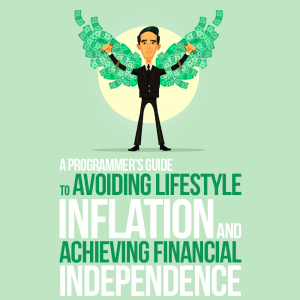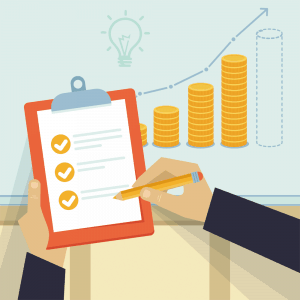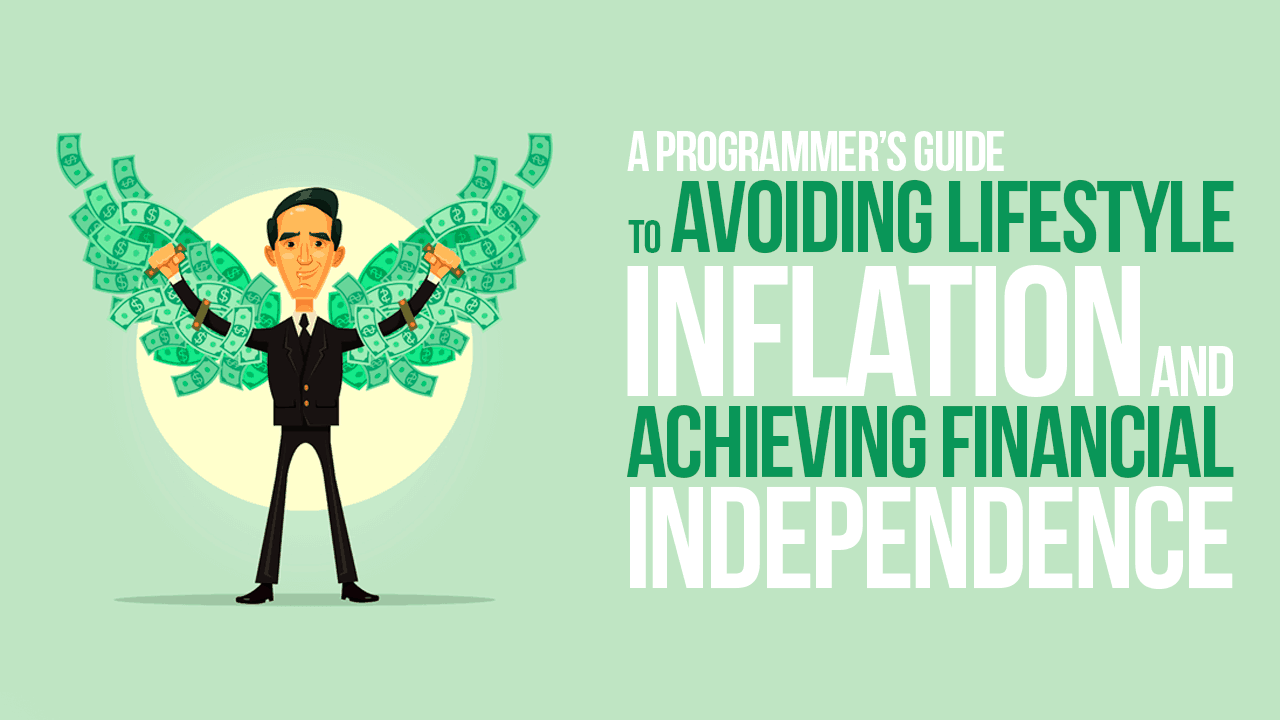 Becoming a programmer is a lucrative pursuit if successful. With an average salary around $85,000 a year, it isn’t unheard of to eventually be paid in excess of $150,000. To most people, that’s a lot of money.
Becoming a programmer is a lucrative pursuit if successful. With an average salary around $85,000 a year, it isn’t unheard of to eventually be paid in excess of $150,000. To most people, that’s a lot of money.
A lot of people try to become programmers for that very reason. When you land your first job as a programmer, your income could double or maybe even triple overnight.
If you can get your finances on track from the beginning, you can easily become financially independent in 10 years or so. Being financially independent means you have enough passive income coming in to cover all of your expenses. The most common ways of achieving this are through stock market and real estate investing.
With stock market investing, the idea is to have a large enough pile of money so that the interest earned is enough to support your spending. If you go the real estate route, you’ll need enough units to cover your expenses with rental profits. You can always use both stocks and real estate.
As a programmer, it’s common to eventually get burned out. With financial independence as a goal, you’ll have something to motivate you to go to work. Once you have enough money set aside, you could take a year or a few months off if you start feeling burned out. Money is a tool, and the more you have, the more options open up for you.
I’ve heard several stories from programmers who were smart with their money. Some of them used their savings to negotiate better situations at work. When you aren’t afraid of the financial consequences, what’s holding you back from asking to go part time or take an extended leave of absence? Obviously, you’ll need to be a good worker on top of being smart with your money. Otherwise, your company might not accommodate your requests.
Why Should You Aim for Financial Independence?
You may think you don’t want to pursue financial independence, and as long as you like your job, you want to keep working. That’s perfectly logical thinking, but you shouldn’t dismiss the idea of becoming financially independent just yet.
Have you noticed that I haven’t used the term “retire early”? See, becoming financially independent doesn’t mean you have to stop working. It just means you eliminate the need to work for money. That frees you up to choose when you want to work and what you want to work on. Don’t want to work a full 40 hours a week? Cool, you don’t have to.
Even if you aren’t sold on financial independence, being smarter with your money is never a bad idea. It’s a shame we aren’t taught about personal finance in school.
As a programmer, you probably love to optimize things. Let’s look at what to avoid as well as some things to do with your money for optimal wealth.
Avoid Lifestyle Inflation
You’re most likely going to get a decent pay raise when you transition into your first programming role. Studies have shown that most people increase their spending when their income increases. Don’t let this be you.
Anything that you buy other than necessities is a luxury, so it’s good to develop a thankful mind and realize you don’t need certain stuff.
When you stop worrying about all the stuff you want to buy, you have more room in your mind to think about other people. Helping those in need can lead to a more fulfilling life.
Spending more money most likely won’t make you any happier. Due to hedonic adaptation, our happiness tends to return to a stable level even after drastic positive or negative events and life changes. You’ve probably noticed that the thrill of buying a new iPhone every time a new one comes out dies off rapidly. You’ll need to do some soul searching to truly increase your happiness.
Lifestyle inflation can come in many different forms. If you can buy something, chances are you can spend more money on it. It could be eating out at lunch every day instead of bringing a cheaper meal from home, or deciding to live in a million-dollar house instead of a small apartment.
You’ll have to decide for yourself what level of spending makes you happy. Optimize your material possessions. Start by going through all your things and sell everything you haven’t used in the past year. If you haven’t used it for over a year, you probably aren’t going to.
You’ve probably heard of the minimalist movement. If you can cut out the desire to buy new things all the time, you’ll save a lot of money, and owning fewer things results in a less-cluttered life and less stress. Buying fewer frivolous things means you can spend more on the things that really matter to you. You’ll have higher quality things that will last longer as a result.
If you can optimize the biggest expenses in life, you won’t have to worry about the little expenses as much. The neighborhood and type of house you live in are probably the biggest expenses to worry about. You might have to live in a high-cost area for work, so finding ways to cut back on housing will be important in this situation.
What to Do With Your Money
 Now that you have this big programmer income, it’s time to make a financial plan. You have to have a plan to get where you want to be, and this is especially true when it comes to money. By making a plan, you have something to aim for. You’ll also be able to track your progress toward your goal, and seeing your progress is a big motivator to continue working toward what you want.
Now that you have this big programmer income, it’s time to make a financial plan. You have to have a plan to get where you want to be, and this is especially true when it comes to money. By making a plan, you have something to aim for. You’ll also be able to track your progress toward your goal, and seeing your progress is a big motivator to continue working toward what you want.
Write down some goals. Make some for the short term as well as long term. Write them down no matter how small they are. When you accomplish something, no matter how small, you feel good.
Think about what you want your life to be like in 20 years and what it will take financially to get there. Once you’ve put some thought into what you want to do, it’s time to take action.
Pay Off Debt
The first thing you should do is pay off any debt you may have other than a mortgage. Every dollar you pay toward interest is a dollar you could have invested instead. When you factor in compound interest, a dollar saved is much more than a dollar earned.
Save for a Rainy Day
Once you have your debt paid off, you should set aside some money in a savings account for emergencies. You should probably aim for enough money to cover your expenses for six months or so. So if your expenses are $3,000 a month, you should have about $18,000 set aside.
Put the money in a separate savings account, and commit to not touching it unless you absolutely have to. I would look for a bank that has the highest interest so your money will at least grow a little while it’s sitting there.
Life is uncertain, and you can always count on an unexpected expense popping up eventually. Having money set aside to cover these expenses takes away a lot of the stress you would’ve had if you didn’t have the money.
Invest
Once you have your emergency fund in place, it’s time to start investing. A lot of people are scared to put money in the stock market. Although it is volatile, the stock market has consistently gone up over time, and we don’t have a reason to believe it’s going to crash and never come back up.
The beautiful thing about stocks is compound interest. You put money in, and it starts to earn interest. If the interest is reinvested into the market, you start to earn interest on the interest, and it causes a snowball effect. The earlier you start investing, the more time you have to enjoy compound interest.
Your employer will probably match your 401(k) contributions, so that’s a good beginning, but there is a lot more you should do.
The secret to successful stock market investing is index funds. Index funds spread your money across the entire stock market, so they’re a lot safer than individual stocks. It’s just about impossible to outperform the stock market by choosing individual stocks, so index funds will earn you more money in the long run.
Look over what companies your employer offers to invest with. The best company to have an index fund with is Vanguard. It was the first company to create an index fund, and their business model is to always put the customer first, which they do by offering the lowest-cost funds available. The percentage a company charges you to manage your investments has a huge impact on how much the investment will grow, so it’s important to get the cost down as low as possible.
The best index fund Vanguard offers is the Vanguard Total Stock Market Index Fund Investor Shares (VTSMX). If you have more than $10,000 to invest, then there’s an even cheaper version of the VTSMX you can invest in: the Admiral Shares version called VTSAX. The fees for VTSAX are currently 0.04 percent, and that’s incredibly cheap. If your company doesn’t provide Vanguard funds, then find the closest thing to them that they offer, and go with that. Search the details of the VTSAX, and compare them to the funds your company offers. What you’re looking for are the fees associated with the fund and whether it’s an index fund.
Roth or Traditional?
 One of the things to think about with investing is whether you should choose a Roth or traditional 401(k). The difference between the two is taxes. When you contribute to a Roth fund, you use money after taxes have been paid. You don’t have to pay taxes on the growth of a Roth fund.
One of the things to think about with investing is whether you should choose a Roth or traditional 401(k). The difference between the two is taxes. When you contribute to a Roth fund, you use money after taxes have been paid. You don’t have to pay taxes on the growth of a Roth fund.
When you put money in a traditional 401(k), the money is taken out of your paycheck before taxes. When you go to withdraw the money after you’ve stopped working, you will pay taxes on the growth of the fund.
It may seem like the Roth is the better option, but it might not be if you’re a high-income earner. If you earn more money during your career than you will be living on in retirement, it may be advantageous to choose the traditional option and pay taxes on the investment when your income is lower in retirement.
Let’s say you make $100,000 a year and only need $40,000 to live on. It might be better to put the money in a traditional 401(k) because the taxes will be much less when you cut your income down to $40,000 after you’ve become financially independent.
Another factor is you can’t contribute to a Roth account if you’re single and earn more than $120,000 a year. If you’re married, the cap to contribute to a Roth account is $189,000 a year.
Index fund investing is one of the most passive ways to invest. You just put money in and watch it grow over time. If your goal is to become financially independent as soon as possible, then you should put as much of your income in as you can.
A good strategy is to transfer money to your investment account every day. Even if it’s just $5, every dollar counts and will continue to grow for the rest of your life. Depositing money every day will create a habit of investing, and you’ll want to see how much you can increase your daily amounts.
The typical advice you hear on the amount you should invest is usually around 15 percent. That’s fine if you want to become financially independent in your 60s. With your high programmer salary, it shouldn’t be very hard to invest upward of 50 percent of your income.
The maximum amount you can invest in a 401(k) is currently $18,000. If you can put more than this into investments, after you’ve maxed out the 401(k), you can open a separate individual retirement account and contribute more there. If you’re investing a lot, you can open non retirement funds and put the remaining contributions in that.
How Much Money Do I Need to Invest to Become Financially Independent?
There’s a really simple way to determine how much you’ll need to invest. Figure out the amount of money you’ll need to cover your annual expenses, and multiply that by 25. When you have 25 times the amount of your annual expenses invested, the interest earned from the investments should cover your expenses.
This is the most common formula in the financial independence/index fund community. It’s called the 4 percent rule. If you need $40,000 a year, then you’ll need $1,000,000 invested. The average investment return is about 7 percent, and once you take out 3 percent for inflation, you’ll have about 4 percent, which is $40,000.
See, stock market investing doesn’t have to be complicated! Just open a Vanguard index fund, and throw as much money as you can into it. Soon enough, it will be earning enough interest to support your lifestyle.
Once you’ve got enough saved to support your lifestyle, it’s like owning a company that takes no work or time to run. The money continues to work for you without your having to do anything. This is why index funds are my favorite way to invest.
Real Estate Investing
If the stock market isn’t your thing, real estate investing might be the way to go. It will take a lot more work than index fund investing, but you can potentially earn more money. You’ll have to do your research and decide if you want to deal with house repairs and tenants.
Optimize Housing
Housing can be a huge expense, but like everything else, it can be optimized. Having a nice programmer income can really open up doors to do cool things with your money. One of the things you can do with housing is something called “house hacking.”
House hacking is where you buy a multi unit house or apartment and live in one of the units while renting out the rest. The income you get from the rental units will most likely cover the cost of your unit, and you’ll essentially be living for free. Eliminating your housing cost will free up even more of that programmer salary, and you’ll end up accumulating wealth at a rapid rate.
House hacking isn’t for everyone, though, and it’s fine if you don’t want to bother with it. There are things you can do to cut back on costs other than renting out units. Use your programmer optimization skills to cut your power bill down as much as possible.
Don’t buy more house than you need. Don’t buy in an expensive neighborhood just to be fancy. Make sure you live as close to work as possible. The cost of commuting can have a huge impact on your wealth accumulation.
Eliminate as many recurring costs as you can. Cut the cable and as many monthly subscriptions as you’re comfortable with. Use as little water as possible, and try to do as much of the house repairs as you can on your own. Keep you A/C at the warmest temperature you can bear during the summer and the coolest you can bear in the winter.
Determine What You Want to Do When You Don’t Need to Work
When you have everything optimized and set in place, you should start thinking about what you really want out of life. Pursuing financial independence without a plan of what you’ll do when you get there will result in your getting bored when you quit your job.
Benjamin Franklin became financially independent at age 42. He had created a successful printing business and no longer needed to work for money. After that, he devoted his time toward things he was truly passionate about and invented the lightning rod at age 44. Most of the things he is famous for happened after he had enough money to support his lifestyle.
at age 42. He had created a successful printing business and no longer needed to work for money. After that, he devoted his time toward things he was truly passionate about and invented the lightning rod at age 44. Most of the things he is famous for happened after he had enough money to support his lifestyle.
If you’re passionate about something outside of work, maybe you can use your programming skills to work on your passion projects.
Having the freedom to spend your time on the things you care most about is the whole goal of becoming financially independent. Thinking about what you’d like to do most in life will make going to work more fun because you’ll be on a mission to get to your goal.
We should all strive to make the world a better place, and we are more free to do that once we’re financially independent.
You have something to contribute. You might not see it, but if you think about it for a while, you’ll come up with something you can do to benefit the world. You’ll find more meaning in life as a result.
You’ll also develop yourself more as a person by being able to work toward the life you truly want. The awesome thing about it is, you get to decide what your life will become.

